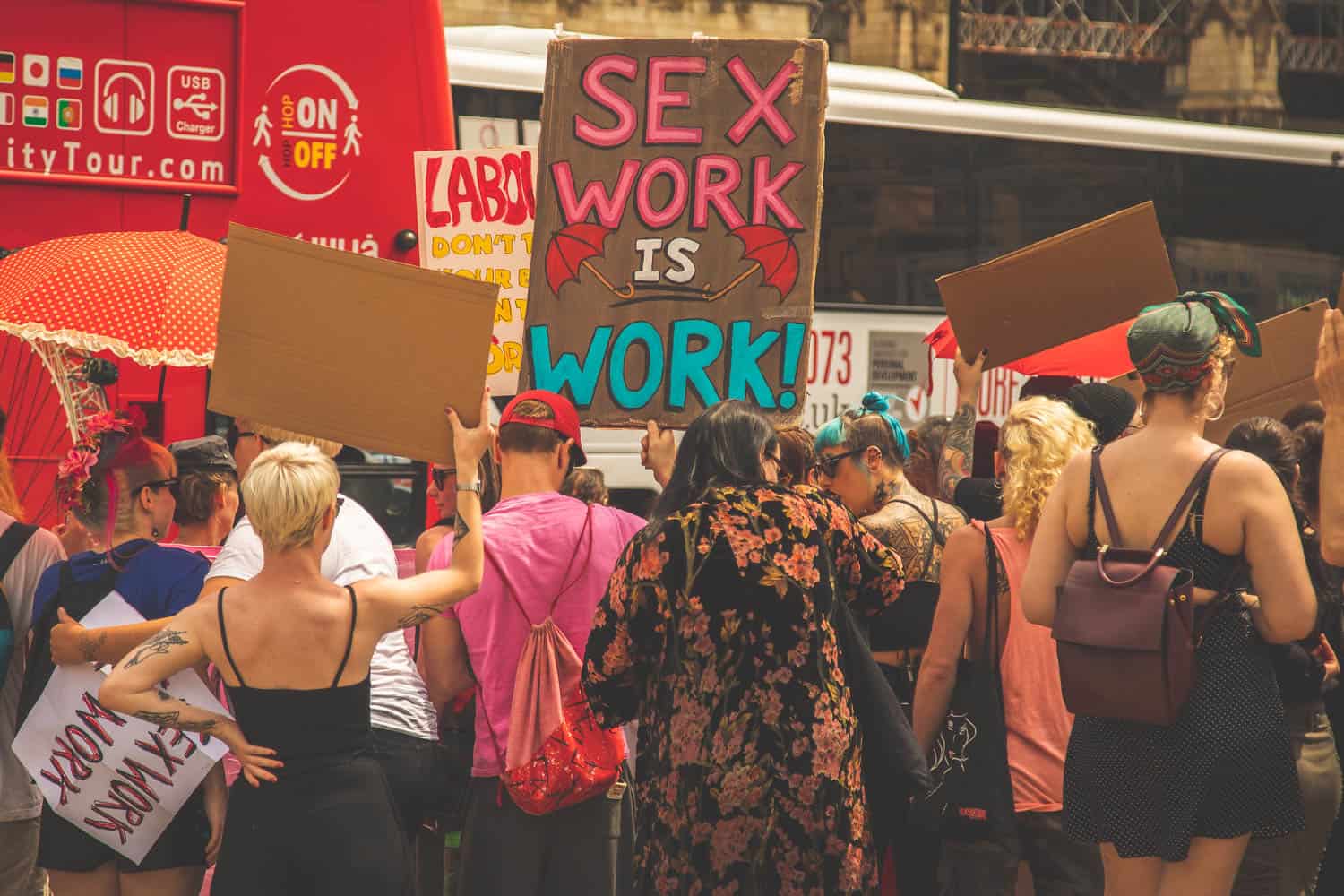
Gwendolyn Gissendanner is a student at Harvard Law School and a member of the Labor and Employment Lab.
On August 19th, OnlyFans—a London-based company popularized for its subscription-based user content—announced its plan to ban media that “shows, promotes, advertises, or refers to real or simulated sex.” While the site later suspended its plans after backlash from sex workers, speech, and labor organizations, the impact of the decision, and pressures from its financial backers, continue to create uncertainty for the site’s more than 150 million registered users.
The decision came as a shock to OnlyFans content creators because of the site’s exponential growth throughout the pandemic; usership increased from 20 million to 120 million between March 2020 and April 2021. While much of this growth came from an influx of celebrities joining the platform, the site’s revenue and popularization as gig-economy sex tech, can largely be attributed to content created by sex workers over the past year. Numerous performers, facing unprecedented unemployment, discrimination in federal assistance programs, and covid exposure risks, turned to OnlyFans as a primary and supplemental stream of income to adapt to pandemic restrictions. The site served as a haven for sex workers, especially those who are immunocompromised or living with disabilities, since they could post and receive payment for their services and content in a safe manner. This large shift to “remote sex work” also decreased barriers for individuals hoping to enter the sex industry—which historically privileges white, cisgender sex workers—by allowing for consenting and properly compensated exchanges between content creators and their subscribers.
The founder of OnlyFans, Tim Stokely, made clear that the initial decision came in response to pressures from its banking partners, Bank of New York Mellon, Metro Bank, and JPMorgan Chase, who refused to service the site based on “reputational risks”. In response, the site publicly announced its decision “to comply with the requests of [their] banking partners and payment providers [to ensure] the long-term sustainability of [their] platform.”
This move, while abrupt, follows a clear pattern of financial institutions decreasing their dealings with companies producing adult content. Sites like OnlyFans often face difficulty attracting traditional investors as venture capital firms honor “vice agreements” preventing them from investing in industries that carry the risk of harming their reputation. Traditional banks also face concerns about inadequate moderation of sites with sexually explicit content, and subsequent illegal media such as revenge porn and videos of underaged, and/or nonconsenting participants. Banks backing sites with such content face money laundering risks and regulatory investigations when illegal content goes unaddressed. Rather than facing reputation-damaging investigation and subpoenas, banks set their own internalized mechanisms to address compliance risks, which historically involves refusing to deal with sites like OnlyFans altogether.
For OnlyFans specifically, the financial institutions’ concerns likely stems from recent media and political scrutiny. Earlier in August, the BBC approached the site and revealed investigative findings related to their handling of illegal content. In the U.S., financial institutions, adult entertainment companies, and credit card companies continue to respond to intensifying scrutiny from policy makers concerned with sexually explicit sites’ link to trafficking, culminating in an August 10th request from Republican representatives for the Department of Justice to investigate OnlyFans.
The OnlyFans situation, skewed by political pressure, ultimately highlights the power banks hold to relegate sex workers to the outskirts of the economy. By serving as quasi-intermediaries between federal regulators and “vice” industry workers, financial institutions become powerful arbiters and gatekeepers for sex workers’ access to just compensation.
To make matters worse, many of these concerns—while veiled as responses to human trafficking—originate from religious-right, sex-work abolitionists—rather than organizations steeped in the work. This conflation of legal adult entertainment with abuse ultimately fails to address trafficking and makes sex work as hard and as dangerous as possible.
Sex workers felt abandoned and insulted after the site’s decision to follow political pressures since their content helped OnlyFans reach its valuation of more than $1 billion. For Black and Transgender creators, who are most likely to be de-platformed on OnlyFans and other social media sites and most likely to face discrimination within the traditional workforce, the response extended to material fear. Activists organized on social media after the announcement to condemn payment services and banks for “dictating who gets to work and who doesn’t… and for deciding “who gets respected for their labor, time, and talent.” Many in the industry saw the move as another example in a long line of websites “building their entire brands on [sex workers’] labor, [their]bodies, and [their] influence, before turning their backs…as soon as it benefits them financially.”
Two days after its initial announcement, and in response to calls from these activists, OnlyFans addressed sex workers directly, confirming they planned to work around the clock to come up with solutions, ending their tweet with #sexworkiswork. The site followed its word, and on August 26th, six days after their decision, announced they secured the necessary assurances from their financial institutions to suspend the policy change. Unfortunately, damage had already been done. Millions of content creators lost significant amounts of subscribers and income during the time that passed.
While beneficial in the short term, this indefinite suspension didn’t create stability. Content creators are weary of placing their trust in OnlyFans—as opposed to other sites allowing user-generated sexually explicit content. The shift to less popular sites still decreases reach and many utilize similar payment processes—meaning they are likely dealing with similar pressures to change their user guidelines.
The uncertainty of the last month did, however, refuel conversations about labor and speech rights of sex workers. Activists like Lydia Caradonna, founder of UK-based organization Decrim Now, continues to stress the importance of organizing within the industry to address the livelihoods of sex workers and think about the precedent that can be set for all sexually-themed online speech, hook-up apps, and health education—topics that are all implicated through processes to criminalize and devalue sex work. Sex workers also continue to adapt in the meantime to address material uncertainty. After the OnlyFans announcement, sex workers fled to Fansly, based on their announced goal to “make a significant impact on improving the lives of an industry that has too often been ignored or feared.” Other sex workers turned towards sites specifically by and for sex workers, like JustForFans.
Shifting to other sex-worker supportive platforms still creates banking concerns, and growing financial alternatives, such as cryptocurrencies, still only act as temporary solutions since currencies created for adult sites can still be excluded from mainstream exchanges, face risks as the currency fluctuates, and are more likely to be targeted by anti-sex advocates. For these reasons, sex workers continue to call for long-term solutions from banks to adopt policies that think of sex workers as “people, instead of moral failings.” They also continue to lobby legislators to holistically address occupational discrimination against sex workers and the personal impact of current regulation of “vice” industries. As for OnlyFans, activist ask, at minimum, for the site to hire sex workers to occupy spaces where major decisions about the platform are made. For the sake of its creators and its future, hopefully OnlyFans will heed these calls to action and recognize their dependence on, and ability to better the lives of its primary creators.







Daily News & Commentary
Start your day with our roundup of the latest labor developments. See all
July 4
The DOL scraps a Biden-era proposed rule to end subminimum wages for disabled workers; millions will lose access to Medicaid and SNAP due to new proof of work requirements; and states step up in the noncompete policy space.
July 3
California compromises with unions on housing; 11th Circuit rules against transgender teacher; Harvard removes hundreds from grad student union.
July 2
Block, Nanda, and Nayak argue that the NLRA is under attack, harming democracy; the EEOC files a motion to dismiss a lawsuit brought by former EEOC Commissioner Jocelyn Samuels; and SEIU Local 1000 strikes an agreement with the State of California to delay the state's return-to-office executive order for state workers.
July 1
In today’s news and commentary, the Department of Labor proposes to roll back minimum wage and overtime protections for home care workers, a federal judge dismissed a lawsuit by public defenders over a union’s Gaza statements, and Philadelphia’s largest municipal union is on strike for first time in nearly 40 years. On Monday, the U.S. […]
June 30
Antidiscrimination scholars question McDonnell Douglas, George Washington University Hospital bargained in bad faith, and NY regulators defend LPA dispensary law.
June 29
In today’s news and commentary, Trump v. CASA restricts nationwide injunctions, a preliminary injunction continues to stop DOL from shutting down Job Corps, and the minimum wage is set to rise in multiple cities and states. On Friday, the Supreme Court held in Trump v. CASA that universal injunctions “likely exceed the equitable authority that […]